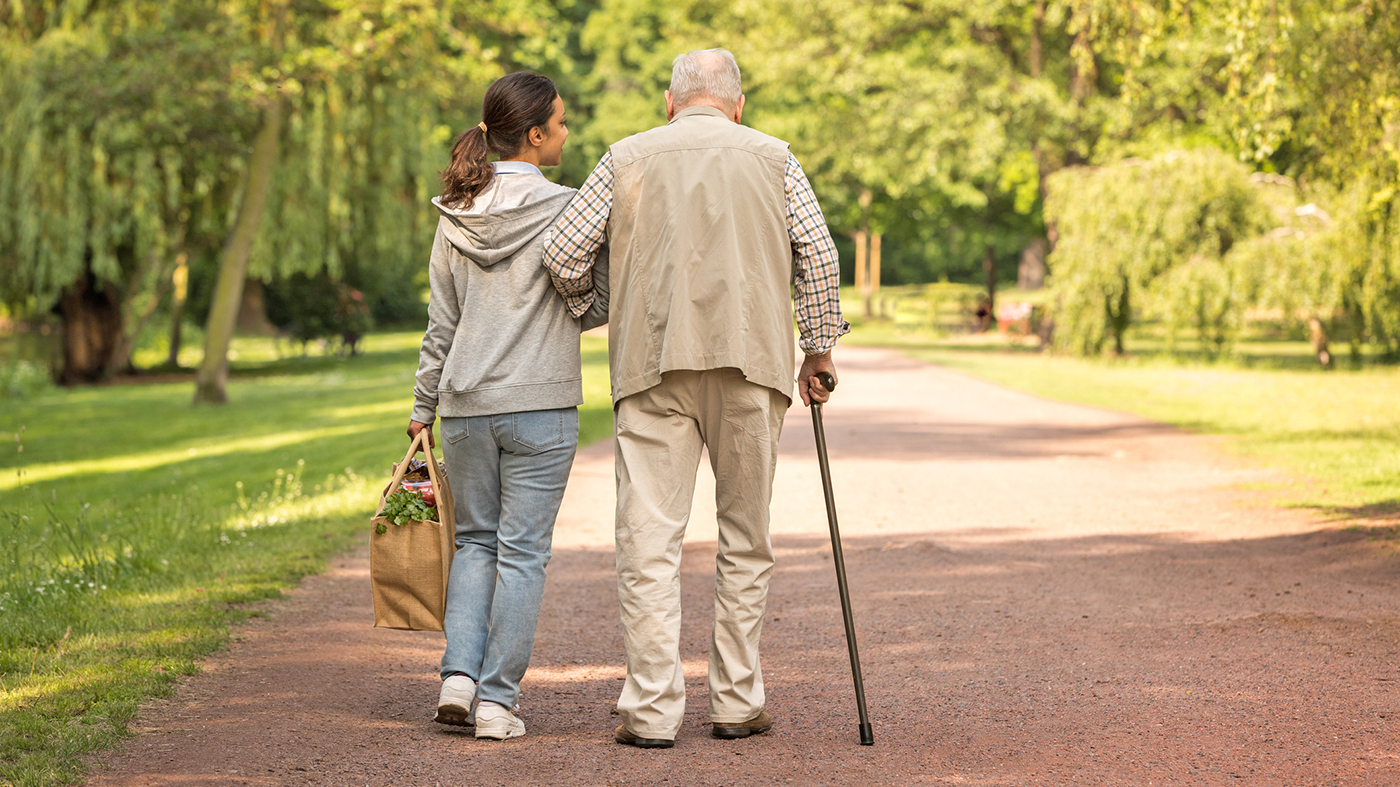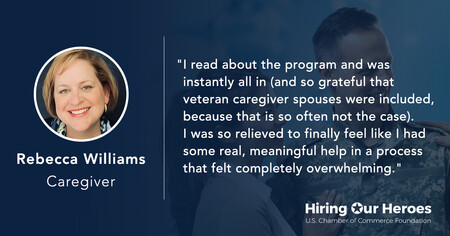Caregivers for Veterans face unique challenges when re-entering the workforce. To help address these challenges, Hiring Our Heroes (HOH) partnered with the Wounded Warrior Project to create a Caregiver Fellowship Program.
The program matches caregivers with paid 12-week internships suited to their skill sets and career goals. In turn, caregivers build their professional networks and gain job experience with employers.
Who is eligible?
Applicants must meet the following requirements:
- Be a current or previous caregiver. Caregivers include spouses, parents, family members and friends who care for America’s wounded, ill or injured Veterans.
- Reside in the United States.
- Be unemployed or underemployed.
- Have an associate degree or equivalent professional experience/certifications.
- Have a resume not exceeding two pages.
- Be available Monday through Friday from 8 a.m. to 5 p.m. during the 12-week fellowship.
- Have transportation.
Hiring Our Heroes encourages eligible caregivers to complete the Caregiver Fellowship Program application online. Select “Caregiver of Wounded Warrior” in the Fellow Type dropdown menu.
What to expect?
Once you complete the application, it will be assessed by a Hiring Our Heroes program manager. This process helps caregivers be competitive candidates for their fellowship interviews. Once accepted into the program, caregivers connect with employers based on how closely their skills, education, experience and professional goals align.
Next, host companies select caregivers for fellowships. Fellows undergo 12 weeks of professional training, networking and hands-on experience.
What military caregivers say
“The fellowship helped me secure a full-time and remote job with the flexibility I need to be a caregiver for my husband,” said Rachel Bertolini, a military caregiver working at Trace3 in Denver.
“I needed to do this because I had to be the breadwinner for our family,” said military caregiver Rebecca Williams, who works at BEAT LLC in San Antonio, Texas. “This [program] provided a leg up in my return-to-work journey. [Now] I am on a path to a fulfilling career that provides financial security for my family.”
“Before the fellowship, I struggled to find my next career,” said Michael Gao, a military caregiver working at USAA in Phoenix, Arizona. “The fellowship inspired me to break out from my comfort zone. I discovered professional opportunities that align with my passion in data analytics. It propelled my career forward and changed my life.”
Click HERE to learn more about your eligibility and application process for the Caregivers Fellowship Program.
The sharing of any non-VA information does not constitute an endorsement of products and services on the part of VA. Veterans should verify the information with the organization offering.
Topics in this story
Link Disclaimer
This page includes links to other websites outside our control and jurisdiction. VA is not responsible for the privacy practices or the content of non-VA Web sites. We encourage you to review the privacy policy or terms and conditions of those sites to fully understand what information is collected and how it is used.
Statement of Endorsement
Reference herein to any specific commercial products, process, or service by trade name, trademark, manufacturer, or otherwise, does not necessarily constitute or imply its endorsement, recommendation, or favoring by the United States Government, and shall not be used for advertising or product endorsement purposes.
More Stories
Vetrepreneur offers free franchise coaching to navigate the process of selecting and evaluating a franchise.
American Corporate Partners provides free dedicated mentors for Veterans and military spouses to supercharge your job search.
The Tragedy Assistance Program for Survivors (TAPS) helps survivors who are grieving the death of a military or Veteran loved one navigate the holidays.







My Brother is my caregiver with no pay. I’m a Vietnam Era Veteran 1971-1977. He is the only family able to devote 24/7 and we live in a home together. I qould really like hom to be paid, we are both on fixed incomes. We struggle through it, but as Veteran if something happens to either one of, it would be game over. Can you direct me to the right place and him as a caregiver for me. He helped another Vet almost 2 years without pay, and when they got someone else that was paid, he was upset. Now I need that help. What are we to do.??
This sounds like a great program, but it seems that there should be a better way to approach the systemic problem of totally and permanently disabled veterans not making enough from their VA compensation to feed and house their families. I’m not suggesting that disabled veterans should be given lavish payments that let them live above their previously established means, but what about providing an income that would at least match their highest documented established earning potential based on their rank at the time they had to leave the service or whatever employment they were able to maintain before their service connected disabling conditions forced them to stop working? It would be easy enough to prove a disabled veteran’s established earning potential, and would also allow their spouses (or other household member caretakers) to continue to care for them without having to split the burden of being there for whatever care their disabled veteran needs and being unavailable to do so because they’re working wherever they can manage to find gainful enough employment to make ends meet for their family. It’s a nice idea that VA compensation and healthcare help totally disabled veterans maintain some level of income, but it’s not exactly reasonable that all veterans with totally disabling conditions should receive the same level of compensation as one another when a service connected disability forces someone with a higher established earning potential to lose all that they’ve worked for and try to get by on a one-size-fits-all type of blanket compensation. When I look at what I once made on active duty, to say nothing of the greater salary I earned after my body could no longer handle the rigors of military service, but my mind could still excel at a desk job for a time, it pains me to see my spouse forced to try to compensate for my lost earning potential now that my service-connected disabilities have finally forced me to stop working altogether. I think this system puts undo stress on both the disabled veteran and their caretaker spouse, who would almost certainly have an easier time finding gainful employment while enjoying a higher standard of living by abandoning their disabled spouse, as the current system gives them some financial incentive to do, which is the last thing such veterans need.